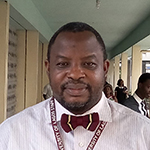 As a paediatric surgeon in Nigeria, my experience is that child survival following emergency surgery is lower compared to children in more developed countries. This is especially the case in the neonatal period. Studies in countries with a low to middle Human Development Index (HDI) have documented several challenges associated with this issue—delays in presentation to health facilities and in surgical intervention after patients present to the hospital, sepsis, and a lack of availability of parenteral nutrition and neonatal intensive care units. However, although globally many agree that effective provision of emergency essential surgery is a key priority for the global child health agenda, in practice nothing has been done.
As a paediatric surgeon in Nigeria, my experience is that child survival following emergency surgery is lower compared to children in more developed countries. This is especially the case in the neonatal period. Studies in countries with a low to middle Human Development Index (HDI) have documented several challenges associated with this issue—delays in presentation to health facilities and in surgical intervention after patients present to the hospital, sepsis, and a lack of availability of parenteral nutrition and neonatal intensive care units. However, although globally many agree that effective provision of emergency essential surgery is a key priority for the global child health agenda, in practice nothing has been done.
Our new study published in BMJ Global Health this week is the first to quantify global morbidity and mortality associated with emergency surgery in children across countries stratified by HDIs. In doing so it provides a unique piece of evidence for policy makers to prioritise resources and personnel to stem the issue of poor survival in children after emergency. Our findings indicate that adjusted mortality in children following emergency abdominal surgery may be as high as seven times greater in low- and middle-HDI countries compared with high-HDI countries.
The professional “crowdsourcing” used by the GlobalSurg Collaborative to gather this prospective data from frontline clinicians across 58 countries is an efficient, economical, and effective method for collecting comparative global health data. While there are a number of research collaboratives across countries and continents that are aimed at generating high quality data to advocate for better global surgery outcomes, many are restricted to adult populations.
So, when I had the opportunity to partner with GlobalSurg, as a paediatric surgeon in Nigeria, I emphasised the unique gap that will be filled if data from children were captured along with data from adults. This study showed that complex congenital anomalies are attended to in low and middle HDI countries, as in high HDI countries, and that the surgical personnel are trained and willing to take up challenges. However there are other systemic issues that mitigate against good outcomes. I hope to address three of these issues here.
Firstly, the lack of adequate health insurance coverage and/or subsidies for children is a major issue in low and middle HDI countries. The majority of children are treated in hospitals on an “out-of-pocket” basis. And in most Sub-Saharan African countries where there is pervasive poverty, this is largely responsible for delay in presentation to the hospitals as the cost of transportation to specialist centres, and cost of accommodation in the cities are deterrents until alternative medical care fails. In a similar vein, a lack of government subsidies in the hospitals also causes delay in surgical intervention. Some patients present to hospital with a child requiring emergency surgery with less than $1 USD which is not enough to cover investigations, let alone surgery. As a result many of these patients present late when surgical intervention may not be able to help.
Secondly, for low and middle income countries to have improved survival following surgery in children, especially neonates, there must be provision of total parenteral nutrition services and neonatal intensive care units with well-trained allied medical professionals. It is well-known that most low and middle HDI countries have low budgetary allocations for health. For example, Nigeria’s budgetary allocation to health has been below 7%, unlike higher income countries such as the USA and Japan, where spending ranges in excess of 17% and 20% of GDP respectively. Hence, it is difficult for hospitals to achieve upgrades in facilities and capacity building of their staff, two critical factors in achieving better surgical outcomes in any health system.
Thirdly, there is a need to have a systematic programme to educate the populace about the role of surgery in child health, particularly in low and middle HDI countries. Many mothers (and fathers too) are apprehensive once their child or ward requires surgery and some have bluntly declined. Others seek alternative medical options, which for surgical conditions, hardly ever work. Therefore, the judicious use of the media, community opinion moulders, and health professionals to disabuse parental concerns about surgery are important to achieving better uptake for surgical services among the populace.
The aims of the erstwhile Millennium Development Goal on child health can only be achieved by incorporating surgery as an essential part of child survival strategies. Furthermore, comprehensive health insurance to cover children would be ideal. Governments should also consider subsidising paediatric surgery costs to to improve child survival. Governments of low and middle HDI countries should increase the budgetary allocation to health to improve facilities and quality of personnel, while improving health education to remove patient apathy to surgery. We hope that the results of the GlobalSurg study now provides the evidence to help escalate these policies up the global child health agenda.
Adesoji Ademuyiwa is the National Lead for GlobalSurg collaborative in Nigeria and a member of the Steering Committee of GlobalSurg collaborative. He is currently an Associate Professor of Paediatric Surgery at the University of Lagos and Honorary Consultant Paediatric Surgeon at the Lagos University Teaching Hospital.
Competing interests: None declared.